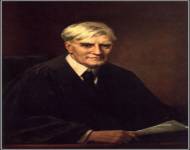Early Life
Benjamin Cardozo was born May 24, 1870 in New York City to Rebecca Nathan and Albert Cardozo. Cardozo’s father served on the New York Supreme Court (New York’s trial court) until he resigned due a judicial corruption scandal. Afterwards, his father continued his legal career as a successful lawyer.
As a young boy, Cardozo was privately tutored by author Horatio Alger. Cardozo entered Columbia University at the age of fifteen. Four years later, Cardozo graduated and enrolled in Columbia’s graduate school, where he earned his master’s in political science. Subsequently, Cardozo continued his education at Columbia by enrolling in the law school. Cardozo completed two years of law school before leaving and entering the profession.
Career
Cardozo was admitted to the bar in 1891 and began working alongside his brother in appellate and commercial law. In 1913, Cardozo entered politics and won election to the New York Supreme Court. Shortly thereafter, he was promoted to the Court of Appeals.
Cardozo authored many impactful opinions regarding contract law. In Wood v. Lucy, Lady Duff-Gordon, 118 N.E. 214 (1917), Cardozo implied a duty to use reasonable efforts where a party was contracted for exclusive rights to market a celebrity likeness. In Jacob & Youngs v. Kent, 230 N.Y. 239 (1921), Cardozo held damages for an innocent or nonmaterial breach of contract is the difference in value not the cost of replacement.
Additionally, Cardozo provided a number of notable decisions involving tort law. In MacPherson v. Buick Motor Co., 111 N.E. 1050 (1916), Cardozo expanded product liability by allowing manufacturers of products to be held liable for consumer injuries. In Martin v. Herzog, 126 N.E. 814 (1920), Cardozo established the breach of a statutory duty is negligence in and of itself, but the breach must in some way contribute the accident. The most impactful decision in tort law came in Palsgraf v. Long Island Rail Road Co., 162 N.E. 99 (1928), where Cardozo established proximate causation as an element of a tort law claim.
Further, in 1923, Cardozo helped found the American Law Institute, which is the published the Restatements of Law for various legal subjects.
In 1932, President Hoover nominated Cardozo to replace retiring Justice Olivier Wendell Holmes on the United States Supreme Court.
Supreme Court
While on the court, Cardozo helped uphold important programs under the New Deal. In Steward Machine Company v. Davis, 301 U.S. 548 (1937), Cardozo authored the 5-4 majority holding the federal unemployment tax system of the Social Security Act did not violate the Fifth Amendment or Tenth Amendment because it facilitated a cooperative effort between state and federal government instead of diminishing state sovereignty and power. In Helvering v. Davis, 301 U.S. 619 (1937), Cardozo penned the majority opinion, which upheld the federal program of Social Security because it fell within the Constitution’s Article I Section 8 “general welfare” clause.
One of Cardozo’s more famous decisions came in Palko v. Connecticut, 302 U.S. 319 (1937). Through Cardozo’s opinion, the Court held the Fourteenth Amendment was not a vehicle for which the Fifth Amendment’s “double jeopardy” provision could be applied to the states. Cardozo’s opinion provided “good law” until it was overruled in Benton v. Maryland, 395 U.S. 784 (1969).
Later Years
Cardozo died of poor health on July 9, 1938 in Port Chester, New York. He never married and fathered no children.
In 1976, Yeshiva University founded the Benjamin N. Cardozo School of Law in New York City.








